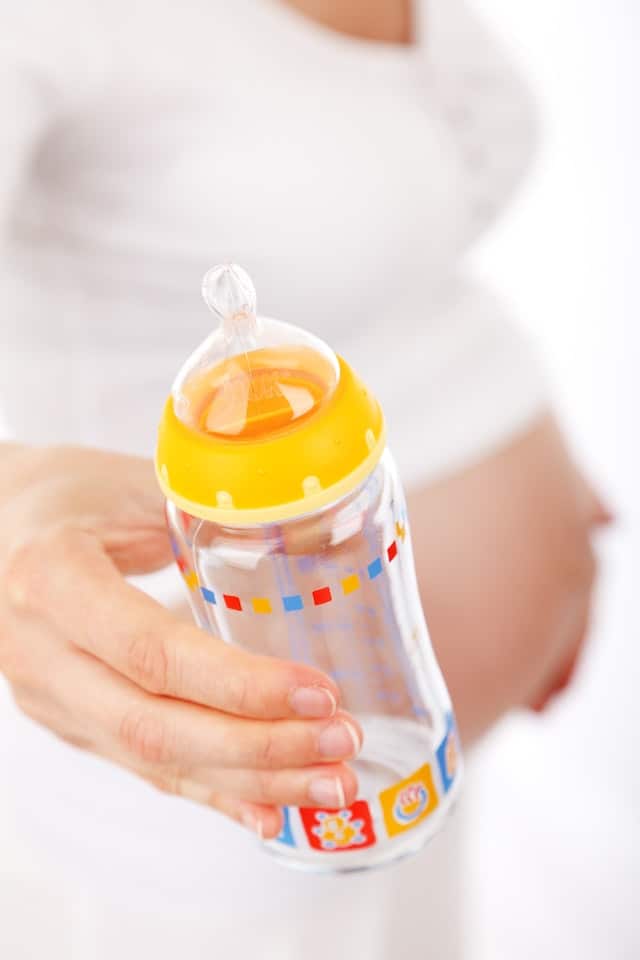Near the top of the seemingly endless choices new parents must make are choosing the right baby bottle for their newborn. Glass bottles might not be an obvious or first choice for new parents, but they offer many benefits which shouldn’t be overlooked.
So what exactly are glass baby bottles?
Glass baby bottles are feeding containers made of glass. The body is constructed entirely of glass, while using a silicone nipple for the baby to chew on. They are the oldest type of bottle that we still commonly use today.
Are glass baby bottles good for babies?
Yes, glass bottles are generally safe for babies! Glass bottles have been around for many, many years and have proven to be a safe and reliable way to feed your baby. Glass bottles offer a few benefits over plastic and silicone bottles.
The health and safety of your baby is always a top priority for parents, so it’s understandable that you may be wondering if glass bottles are safe for your little one. Please read the following sections to learn more about the benefits of these great bottles.
One of the main concerns people have with glass bottles is their potential to break if dropped. While this is true, it’s important to note that these bottles are designed to be tougher than the glasses you have in your kitchen cabinet. They can take some abuse.
However it’s important to handle glass bottles with care, just as you would any other type of bottle or container.
Overall, glass bottles are safe for babies and offer several advantages over plastic and silicone bottles. Just remember to handle them with care and keep an eye out for any signs of damage or wear before using them. If you are unsure how to do this, you can read this post I wrote about knowing if it’s safe to reuse a baby bottle.
What are the benefits of glass baby bottles?
- Normally non-toxic, which means they are much healthier for babies than plastic bottles.
As opposed to plastic, glass does not contain any harmful chemicals such as Bisphenol A (BPA) or phthalates, which can leach into the milk or formula and harm a baby’s developing body.
That being said, not all glass bottles are safe. Be sure to get high quality bottles from brands you trust. Occasionally bottles come around containing materials like lead or cadmium, which can be quite harmful to your baby.
- Strong and durable.
They are much less likely to crack or break than plastic bottles, so you can be sure your baby’s bottle will last for years to come.
Sure, if you drop a glass bottle on a hard floor or counter, it certainly could break.
However they are pretty strong and can take some abuse. Glass bottles are generally thicker than glasses adults usually drink from and are designed in a way to take abuse without shattering.
In addition to help with any concerns about glass pieces on the floor, some glass bottles come with a silicone cover. If your bottle falls on the floor, the silicone cover should keep all pieces contained allowing you to dispose of it easily and safely.
- Easier to clean than plastic.
Glass is non-porous, so it does not retain odors or stains like plastic does, making it easier to keep your baby’s bottle clean and hygienic. Plus, glass can be heated or sterilized in the microwave or boiling water with ease.
If you are unsure about cleaning your baby bottles, you can read this post I wrote.
I wrote.
- Better for the environment.
It’s a natural resource that can be recycled over and over again, which means less waste going into landfills. While other bottles will only last a limited time before they wear out, glass can continue to be reused throughout the generations.
- You can heat your baby’s milk directly in the bottle.
Because the bottles are non-toxic and are resistant to thermal shock, they won’t warp, crack, or leach harmful chemicals when heated.
This makes them great companions on road trips or in busy situations where you want to store formula already mixed in the bottle.
What are the drawbacks of glass baby bottles?
- Can be heavy and bulky compared to plastic bottles, making them difficult to transport and use on the go.
To make them stronger, they are often thicker than any other bottle. That thickness, with the extra weight that glass brings to anything causes them to be the heaviest bottle.
This means that you’ll be helping your baby to hold their bottle longer than you would with other bottles. It’ll be a while before you can set them down on a pillow so they can feed themselves.
- If a glass bottle does break, the pieces can be sharp and cause injury.
While glasses are tough and durable, they can still break. They probably have a higher likelihood of this than other bottle types.
When this happens, you must be very careful to clean up every last piece of glass. You do not want to miss any and then let your little baby crawl through that area to find the pieces you missed.
Some bottle manufacturers minimize this risk by including a silicone cover for the bottle. If the bottle does break, the silicone cover should keep all the glass safely contained and easily disposed of.
- They are more expensive than plastic bottles.
Glass bottles cost more to produce and ship, are produced in lower quantities, and have lower demand. All this leads to higher prices for those bottles.
However those high prices can be offset by the fact you will likely use these bottles for all of your future children. Once you no longer need the bottles you could sell them to someone else or give them to another parent in need.
Over time glass bottles will likely become cheaper than other types. It just can take a while to get there.
- Fewer options and harder to find.
Like I said before, supply and demand can both be fairly low for this type of bottle. Many stores don’t stock glass bottles at all, and you might only be able to purchase them online.
Thankfully this is becoming less and less of an issue. As new parents continue to learn about the drawbacks of plastic bottles, they are continuing to increase the demand for glass bottles. This is leading manufacturers to offer more and more options.
When choosing such an important item for your family, selecting a bottle without holding it in your hand and seeing it with your eyes can be a little unnerving. That is the time to depend on great reviews and make sure you understand what you will be getting.
- Public perception can be negative.
While glass bottles have been the top bottle for generations, they’ve fallen out of favor to cheaper and more convenient plastic bottles. Many in public may have a negative perception of them. This may lead to you answering questions and being a public advocate for them.
Are glass baby bottles better than plastic?
Glass bottles generally last longer, are easier to keep clean, and don’t have the harmful chemicals that plastic bottles might. However they are more expensive and heavier. Glass bottles are better to use in most situations.
You can read my post all about plastic bottles here .
.
I can’t speak for your specific situation, but I’m confident that after you read the benefits and drawbacks of each, you will know which is better for you.

